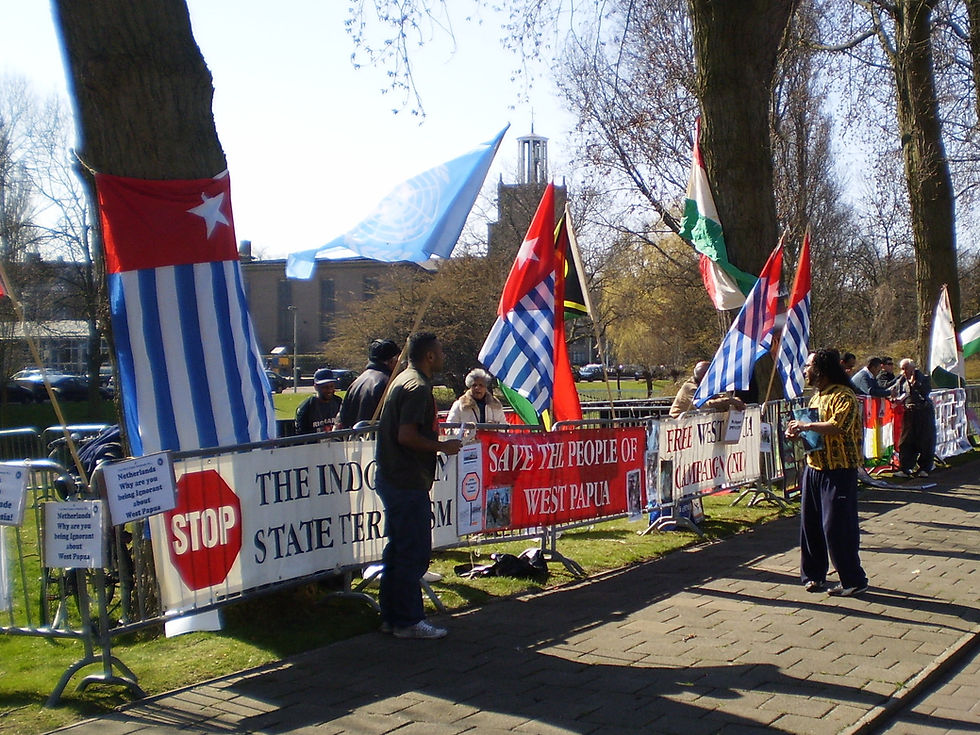Solving Conflict in West Papua is the Key to Indonesia’s South Pacific Engagement
- Oct 24, 2023
- 4 min read
Camille Luchs | Indo-Pacific Fellow

Indonesia has historically overlooked the Pacific in its foreign policy. However, as the ongoing conflict over independence in West Papua continues to attract global attention, the region may prove a focal point that shapes Indonesia’s relationship with the South Pacific Islands. This is in part due to Indonesia’s use of West Papua as a pathway to a Pacific Islands identity. It is crucial that Indonesia address human rights abuses in West Papua to restore trust and meaningful cooperation in the region.
Conflict in West Papua, underscored by pro-independence insurgency, has persisted since a United Nations-mandated plebiscite confirmed Indonesia’s sovereignty over the territory in 1969. Against a backdrop of US-mediated negotiations, administration of West Papua was transferred from The Netherlands to Indonesia on the condition that an ‘act of self-determination’ would be carried out within seven years. In the plebiscite that followed, the so-called ‘Act of Free Choice’, all 1022 votes had been cast in favour of integration with Indonesia. There is evidence to suggest that most, if not all, voting council representatives were either threatened, bribed, or coerced by Indonesian authorities.
Indonesian antagonism of West Papua persists, fuelling low-level insurgency and conflict throughout the region. This is in part due to alleged human rights abuses that have been perpetuated against Papuans. In 2022, conflict reached a new level of escalation – rising to 43 civilian fatalities compared to 27 and 28 civilians in 2020 and 2021 respectively. Whilst Indonesia has acknowledged some human rights abuses, it largely denies allegations and has failed to curb unrest. Between the 1970s and 1990s, Indonesia attempted to control the West Papua using transmigration to change the region’s demography. This policy, in combination with coercive military operations, created a Papuan identity shaped by governmental racial discrimination.
The issue of Papuan independence and human rights abuses in the region has drawn mixed reactions from Pacific Island Countries (PICs). PICs lack consensus on how to best address the ‘Papua issue’, divided by economic interests, protection of human rights and respect for Indonesian sovereignty. For example, the Melanesian Spearhead Group (MSG) has been vocal on the issue, recognising the United Liberation Movement for West Papua (ULMWP) as an observer. Yet, the ULMWP was recently denied membership of the MSG. Reasons cited include ineligibility against the existing criteria and the MSG’s inability to reach a unanimous response.
This does not come as a surprise as there is significant resistance from Indonesia, who was given MSG associate status due to their significant Melanesian population in 2015. Whilst Vanuatu and Solomon Islands have historically advocated for West Papuan independence, it is likely Fiji and Papua New Guinea’s existing Preferential Trade Agreements with Indonesia influenced their decision on ULMWP membership. This is despite many Pacific Islanders supporting the demands of West Papuans for accountability and self-determination.
Amid growing US-China rivalry, Indonesia is seeking to increase meaningful engagement with the Indo-Pacific. Whilst Indonesia has sought leadership among ASEAN nations, its diplomatic engagement with the Pacific has not been as extensive until recently. Indonesia’s ‘Pacific Elevation’ is the country’s attempt to restructure their foreign policy to expand regional engagement in the South Pacific through trade, tourism, and culture. In 2020, Indonesia’s trade to the Pacific was worth around AUD$656 million.
Additionally, the country is seeking to establish itself as a global maritime axis, taking advantage of its geographical position to provide a neutral development alternative to the US and China for PICs. Indonesia has used West Papua as a tool for building this engagement, assuming a Pacific identity based on ethnic and cultural similarities with other PICs. Past claims by Indonesian foreign policy officials that Indonesia is a ‘part of the community of Pacific nations’ and ‘the largest Pacific Island’ highlight the country’s lack of understanding of what it means to be a PIC. It also highlights Indonesia’s lack of understanding of the enduring mark that human rights abuses in West Papua will have on future engagement with the South Pacific.
PICs are not the only countries juggling trade, respect for sovereignty, and human rights in their relationships with Indonesia. Australia and New Zealand have long taken reserved approaches to conflict in West Papua. While Canberra and Wellington both echoed The Netherlands’ support for Papuan independence during the act of self-determination, they have demonstrated little recognition of the ongoing situation in West Papua. Canberra in particular is limited in its response due to the Lombok Treaty, agreeing to mutual respect of state sovereignty and territorial integrity with Indonesia. However, West Papua has resurfaced on both Canberra and Wellington’s radars with the kidnapping of New Zealand pilot Phillip Mehrtens. Both middle powers may once again be called into the West Papua situation as escalation continues and their own citizens are threatened. Yet for the South Pacific, the emerging opportunity to strengthen trade and aid relationships with Indonesia may mark appealing to Jakarta’s goodwill as the path forward for improving conditions in West Papua.
Papua’s bid for independence, and the ongoing violent conflict that underscores this bid, will continue to strain Indonesia’s relationship with the Pacific. The challenge Indonesia faces is building a relationship with the South Pacific Islands that is meaningful and purposeful. Indonesia’s claim of Pacific Islands identity despite the violence perpetuated against the citizens for which they base this claim enhances this difficulty. How Indonesia continues to address conflict in West Papua will be a barrier for further engagement with the South Pacific.
Camille Luchs is the Indo-Pacific Fellow for Young Australians in International Affairs.



Comments